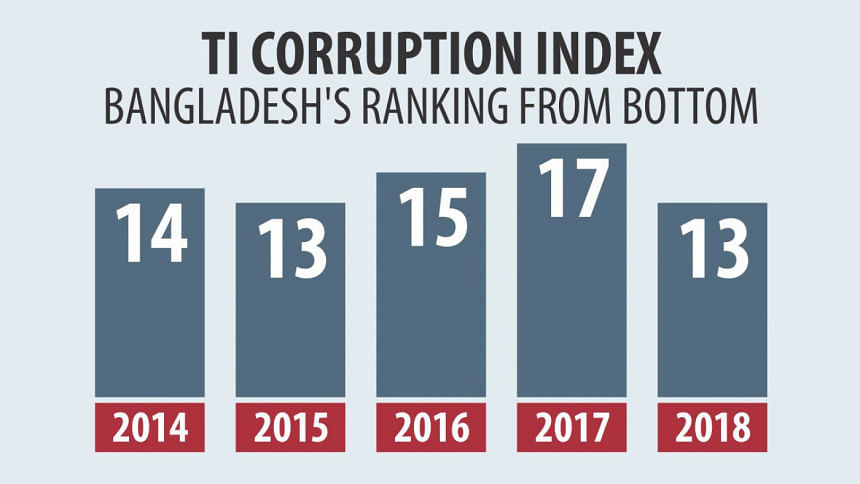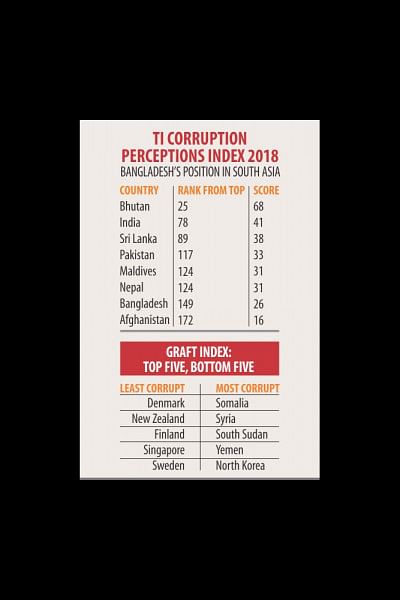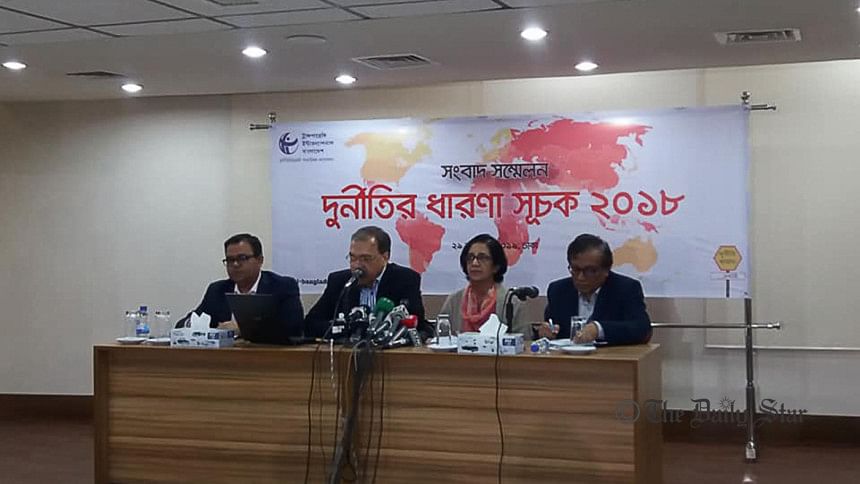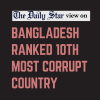TI Corruption Index 2018: Bangladesh slips six notches

Bangladesh has gone down six notches in the Transparency International's global Corruption Perceptions Index 2018 for a lack of effective government measures to fight corruption.
In South Asia, Bangladesh ranked the second lowest, only ahead of war-torn Afghanistan.
The Berlin-based graft watchdog listed a host of reasons for the slide to 149th position out of 180 countries surveyed last year from 143rd the previous year.
The causes include: no practical commitment to curb corruption; little or no steps to stop high-profile corruption; uncontrolled scams and corruption in banking and financial sector; and the Anti-Corruption Commission's failure to act effectively.
The Transparency International, Bangladesh (TIB), the Bangladesh chapter of the TI, shared the findings of the global survey at a press conference at its office in the capital's Dhanmondi yesterday.
The CPI index, which ranks 180 countries by their perceived levels of public sector corruption based on findings by globally-reputable survey sources, uses a scale of zero to 100, where zero is highly corrupt and 100 is very clean. This year's average score was 43.
Bangladesh scored a meagre 26, a little over half of the average. The country's latest position is 13th from the bottom, down from 17th in 2017.
Pakistan scored 7 points more than Bangladesh to position itself at 117, a spot 32 steps ahead of Bangladesh.
Presenting the report, TIB Executive Director Iftekharuzzaman said the ACC, along with other agencies, could play a vital role in curbing corruption.
“The Anti-Corruption Commission lacks the ability to work independently, although it has been somewhat active recently. But it deals with only low and medium level corruption. It cannot play an effective role,” he said.
“There is hardly any example of high-profile corrupt individual getting punished,” he added.

ACC Chairman Iqbal Mahmud said the report would not be acceptable if the TI failed to mention its methodology and causes of rising corruption, although the TI report mentioned both.
“I always welcome such reports. We will fix our course of action if the organisation [TI] specifies the sectors where corruption has increased,” he told reporters at his office.
“Anyone can make sweeping comments about graft,” he said, insisting the ACC was an “independent” body.
“No one interferes in the commission's activities. We are absolutely free and not afraid of anyone,” he claimed.
Replying to Iftekharuzzaman's suggestions that the ACC spares the high-profile corrupt individuals, Iqbal said, “It's true. But how do we catch big corrupt who lives in London?”
He was perhaps referring to BNP chief Khaleda Zia's son Tarique Rahman, who lives in exile in London. Tarique faces 17 years in prison in two corruption cases and life term in the August 21 grenade attack case.

WHERE IS BANGLADESH?
Bangladesh's latest score is 2 points lower than previous year's, and is the steepest fall in a single year since 2008, the report said.
“This is embarrassing and dissatisfactory,” Iftekharuzzaman later told The Daily Star.
Bangladesh's spot is shared by two African countries -- Central African Republic and Uganda.
Among other South Asian countries, Bhutan scored 68 to rank 25th; India scored 41 to rank 78th; Sri Lanka scored 38 points to secure 89th spot; Maldives and Nepal scored 31 points and are jointly ranked 124th.
“As Bangladesh scored 26, it appears that the level of corruption in the country is still concerning,” said the study.
The TI has been publishing the annual report since 1995.
Bangladesh was included in the list in 2001. It was at the bottom of the TI index for five years from 2001 to 2005. The country started doing better in the following years with its score rising. Bangladesh stood 15th from the bottom in 2016, 13th in 2015 and 14th in 2014.
CAUSES, WAY OUT
The factors that prevent Bangladesh from doing better includes non-implementation of the commitment to act against corruption, said Iftekharuzzaman.
No high-profile corrupt person has been brought to trial, he added.
“We are not at the bottom, but still our position is weak. Our score is well below the global average,” he pointed out.
Rise in money laundering, unbridled scams and corruption in banking and financial sector as well as loan default, and political control in public procurement and recruitment are some other factors why corruption prevails in Bangladesh, he added.
“According to the Global Financial Integrity, $5.9 billion was siphoned out of Bangladesh in 2015 through trade mis-invoicing,” he mentioned.
There is conflict of interest, as political and government positions are perceived as means of making wealth. Uncontrolled grabbing of land, river and waterbody, a “denial syndrome” of politicians and the lack of rule of law are also to blame, he said.
The report recommended taking up a National Anti-corruption Strategy to implement the government's stated zero tolerance policy for corruption.
It also suggested bringing the corrupt to justice irrespective of their status or identity and making institutions such as parliament, the judiciary, the ACC, Bangladesh Financial Intelligence Unit, the Comptroller and Auditor General of Bangladesh and the National Board of Revenue more effective.
It also called for professional integrity and impartiality of public service providers, ensuring robust access to information, and increasing space for citizens, the media, civil society and NGOs.
GLOBAL PICTURE
The three least corrupt countries in 2018 were Denmark, New Zealand and Finland with scores of 88, 87 and 85.
The bottom three countries are Somalia, Syria and South Sudan who scored just 10, 13 and 13.
None of the 180 countries surveyed scored 100, meaning corruption remains a major challenge for every country.
“With many democratic institutions under threat across the globe -- often by leaders with authoritarian or populist tendencies -- we need to do more to strengthen checks and balances and protect citizens' rights,” said Patricia Moreira, managing director of the TI.
“Corruption chips away at democracy to produce a vicious cycle, where corruption undermines democratic institutions and, in turn, weak institutions are less able to control corruption,” she added in a statement.
METHODOLOGY
The CPI 2018 is a survey of surveys and the rating is based on findings by 13 international surveys -- rolling data for the period of Nov 2016 to Sept 2018.
Bangladesh's rating is based on findings by eight globally-reputable survey sources. At least three such surveys are required to be eligible for inclusion in the TI index.
No data generated by any of TI's local chapter was considered for the analysis or global rating.
The surveys used for rating Bangladesh are World Economic Forum-Executive Opinion Survey, Economist Intelligence Unit-Country Risk Assessment, World Justice Project-Rule of Law Index, Political Risk Service (PRS) International Country Risk Guide, Bertelsmann Foundation Transformation Index, Information Handling Services Global Insight Country Risk Ratings, World Bank-Country Policy and Institutional Assessment and Varieties of Democracy Project.

 For all latest news, follow The Daily Star's Google News channel.
For all latest news, follow The Daily Star's Google News channel. 








Comments